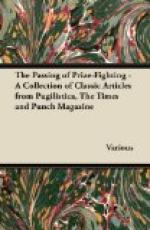He is always perfectly open and frank. He is also sufficiently artful to conceal the fact that he considers the person he is talking to a mixture of a snob and a blockhead.
When his favourite corn is trodden on by a weighty stranger, he never utters any expression stronger than “Dear me!”
He never loses his temper.
He must know how to treat everyone according to their rank and situation in life, but show special courtesy to those who are his inferiors.
He must be well-born, although there are plenty of “Nature’s Gentlemen” in the ranks of day-labourers.
He must be sufficiently wealthy to keep up a good position, while recognising the fact that money has nothing to do with true gentility.
He should also try and remember that no such jumble of contradictions as the Perfect Gentleman ever existed.
* * * * *
[Illustration: HIS BEST “SOOT.”
Short-tempered Gentleman in Black (after violent collision with a Stonemason fresh from work). “NOW, I’LL ARSK YOU JEST TO LOOK AT THE NARSTY BEASTLY MESS AS YOU’VE GONE AND MIDE ME IN! WHY, I’M SIMPLY SMOTHERED IN SOME ’ORRID WHITE STUFF!! WHY DON’T YER BE MORE CAREFUL!!!”]
* * * * *
EPIGRAMMATICALLY PUT.—An Asylums Board Manager wrote to the Times to complain of Mr. LITTLER, M.P., Q.C.’s charges against the Asylums and Fever Hospitals management. “Which is right, or which is wrong,” to paraphrase Mr. Mantalini’s words, is no business just now of ours, but the writer of the reply to the attack, might have summed up by saying “that to him, Mr. LITTLER, whatever his Christian names might be, appeared as a Be-Littler.”
* * * * *
“MR. GLADSTONE ON RENTS IN WALES.”—What the Right Honble. Mr. G. omitted to say, when speaking on this subject, was that “but a comparatively small rent in Wales would be produced by Disestablishment, whenever that event should happen, and that this would soon be mended.”
* * * * *
TEMPERANCE RIDDLE.—Why is a man who is thoroughly good-natured and ever ready to oblige, likely to end as a confirmed drunkard? Because he is always willing.
* * * * *
A USEFUL EXPERIENCE.
I awoke at one in the morning,
I had been two hours in bed,
When—bang!—without
any warning
A joke came into my head.
’Twas brilliant, awfully funny,
It flashed through my drowsy
brain,
It was worth—oh, a lot of money!—
I chuckled again and again.
I thought how I might employ it,
I laughed till the tears rolled
down,
Foreseeing how SMITH would enjoy it,
And how it would tickle BROWN.
I said, “I had best but hint it
To them, or they might
purloin
This wonderful jest, then print it,
And between them divide the
coin.”




